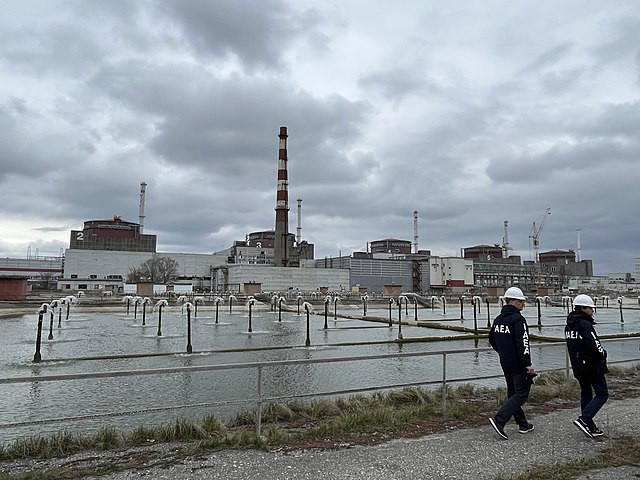The Zaporizhzhia nuclear power plant, Europe's largest, has once again become a focal point of international concern amid reports of shelling attributed to the Ukrainian army. The facility, currently under Russian control following the escalation of conflict over two years ago, is situated in a critically vulnerable position, caught in the crossfire of ongoing hostilities between Russia and Ukraine.
Management at the Zaporizhzhia plant highlighted the gravity of the situation by reporting that an explosive device was dropped near essential infrastructure, specifically close to diesel fuel tanks within the plant's perimeter. This act has been vehemently criticized by the plant's authorities, emphasizing the unacceptable nature of such attacks on critical nuclear infrastructure.
The International Atomic Energy Agency (IAEA), with Rafael Grossi at its helm, has consistently voiced concerns over the potential dangers posed by military actions in the vicinity of the Zaporizhzhia facility. Both Russia and Ukraine have historically pointed fingers at each other for jeopardizing the plant's security through artillery shelling, which has resulted in significant damage to the plant's infrastructure, including the downing of power lines essential for its operation.
Amidst this backdrop of escalating tensions, the UN's nuclear watchdog has issued a stern demand for Russian forces to vacate the Zaporizhzhia site, a call that has been echoed by environmental watchdog Greenpeace. The latter has starkly labeled the plant a "nuclear timebomb," cautioning against the severe implications of any attempts to restart the reactors amidst the ongoing conflict.
The strategic location of the Zaporizhzhia plant, perched on the banks of the Dnipro River and directly in the line of fire from both warring factions, further complicates the already precarious situation. The facility's critical need for uninterrupted power to maintain reactor cooling and prevent a meltdown adds another layer of urgency to the calls for de-escalation and withdrawal of military presence from the site.
In light of these developments, U.S. Senate Majority and Minority Leaders, Chuck Schumer and Mitch McConnell, respectively, have not publicly commented on this specific issue, highlighting a potential gap in the international diplomatic response to the crisis. Meanwhile, the IAEA's resolutions condemning Russia's actions and demanding the withdrawal of unauthorized personnel have yet to yield tangible results, with Russia showing no signs of relinquishing control over the plant.
The dialogue between Putin and Grossi, despite its reportedly "tense" nature, underscores the global stakes involved in ensuring the safety of nuclear facilities, especially in conflict zones. Greenpeace's criticism of the IAEA's role as a "pretend regulator" in this context reflects the broader concerns over the adequacy of international oversight mechanisms in preventing a potential nuclear disaster.
As the standoff at Zaporizhzhia continues, the international community remains on edge, acutely aware of the catastrophic consequences that any misstep could entail. The situation calls for a concerted global effort to secure the plant and avert a crisis that could have far-reaching implications beyond the immediate theater of conflict.
Reuters and The Week also contributed to this report.




